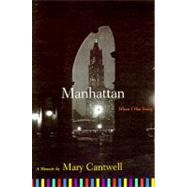Cantwell’s memoir begins after she graduates from Connecticut College 1953 and moves to New York City to be a writer. She is a Catholic from a WASPy town in Rhode Island, but passes well enough. Her mother is not impressed when she marries a Jew fairly soon after graduating. But she’d slept with him, what could she do? I don’t mean to mock. On the outside Cantwell isn’t someone I can relate to, but the quality of her writing voice really got me, both its competence and its appeal, if that makes sense. It seems like the better the writing I’m reviewing the worse my own gets.
Here’s where she talks about her magazine writing. Maybe it just seems so clever because it’s from a different age, but it’s awfully impressive to me.
Working for Vogue, like working for Mademoiselle, would be like eating marshmallows all the time. Even so, writing “Jerry Lewis, thin, dark, and crazy-nuts funny” struck me as a big step up from writing “Plum-perfect taffeta, pleated to within an inch of its life.”
And here’s the kind of stuff I can relate to:
Women without men, women without work. There but for the grace of good typing go I. “But you’ll never be like that, Mary,” the people whom I was with protested when I confided my fear of ending up on a Spanish barstool with teethmarks on one breast. “I am, I am,” I insisted, laughing. They thought I was kidding. I was not.
She’s accomplished and yet feels that it’s luck that got her to where she is and that it could all be taken away at any moment.
I also like her analysis of what writing is all about:
Where I am now [The New York Times] is a very grownup place, and writing editorials is a very grownup occupation. But to me it seems that I have come full circle, that I am copywriting all over again. Describing a dress and describing social policy take the same set of knacks: the ability to analyze, clarify, and compress.
Highlights are scenes from her young marriage--the playing house, the insecurities, codependence; loving her children too much; work at fashion magazines in the 1950s and 60s. If you’re more of a homemaker and cook than I am, and who isn’t?, you’re also likely to enjoy her discussing decorating her various west village apartments and learning how to cook.
Plus, in my early middle-age, I'm a sucker for "when I was young" nostalgia.
I’m really looking forward to reading the stories that sandwich Manhattan When I Was Young in her Manhattan Memoir trilogy.
CATS: She references having some cats and dogs way at the end.
